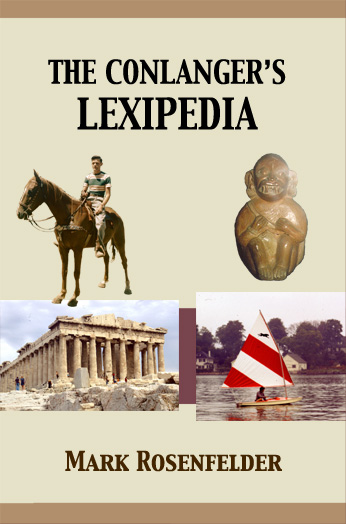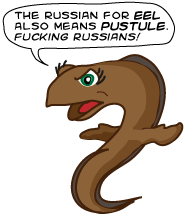

by Mark Rosenfelder
The Language Construction Kit was largely about grammar-- phonology, morphology, syntax, semantics, pragmatics. Its sequel, Advanced Language Construction, went into depth on morphosyntax, as well as logic, sign language, pidgins, and language acquisition.
Is that it for linguistics? No, once you've created a grammar, you still face the hardest and longest task of all: creating words. The Conlanger's Lexipedia, published by Yonagu Books, is designed to help in this process. Its contents:
- A How To chapter which summarizes how to address word creation-- what to think about, what your tools are, what can go wrong.
- The Fantasy Frequency Wordlist, a 1500-item list of the most common roots from a 1.1-million-word corpus of fantasy and science fiction. It's an ordered wordlist designed for world creation, and helps you put your effort where it's most useful.
- Over three thousand etymologies, not just from English but from all over Indo-European, Mandarin, Quechua, and elsewhere. You could re-read the entirety of Carl Buck and the OED each time you create a language, but it's far easier to get ideas from the Lexipedia.
- Lots of divergences from English to think about... not "cute words we don't really need" as you'll find in some books, but everyday words that work differently in other languages.
- The real-world knowledge you need to create domains of vocabulary-- everything from the orders of mammals to military ranks to noble titles to list of guilds to chemical substances. Its my belief that every word is a conlanging opportunity, and the book points out places where you can make the vocabulary reflect your culture, rather than being yet another complicated cipher of English.
- Plus chapters on categorization, etymology, derivation, and metaphor-- the linguist's tools for understanding how the lexicon works. We'll nod to Wittgenstein, George Lakoff, Jorge Luis Borges, John Wilkins, Eleanor Rosch, C.S. Lewis, Guy Deutscher, and Mark Twain along the way.
Did you know...?
Some random bits from The Conlanger's Lexipedia:- John Wilkins, taking some time off from the Royal Society and his bishopric, devised a huge tome classifying everything in the universe into 40 categories, which could also be used as shorthand or spoken as a conlang. A devout man, he dedicated category V to God and XL to Ecclesiastical Relations; he also considered the question of whether Noah's Ark was large enough to provision its considerable human and animal passenger list for a long journey. (Was it? You'll have to read the book!)
- How do you name the lowest and highest points of an orbit round a black hole? Apomelasma has been suggested for the latter of these.
- There are not three primary colors, but four. The commonly given print or computer triads are simply those needed to fool the eye, but many different triads are possible.
- In Montréal, if you say you're going south from the city, the actual cardinal direction is east.
- How did our ancestors make crème brulée without a blow torch? With a salamander, a long tool with a heavy lump of iron at the end. You heated it in the fire, then held it above the food, nicely broiling it.
- In Omaha, there are three persons to be called 'mother'-- what we'd call your mother, your maternal aunt, and the son of your maternal uncle.
- The main metaphor for analysis is that of the mental workshop: to think about an object, we bring it onto the mental table; we turn it around, take it apart, compare it to other things on the table. Analysis is 'loosening' something to break it down into its components; a detail comes from the similar metaphor of cutting things apart. A deduction is 'leading' the argument like a recalcitrant goat; to imply is to fold or wrap something.
- We have five senses, right? Of course not. By some counts we have fourteen. A definitive count is difficult: we may or may not have a functioning vomeronasal organ.
- If you're asked in Japanese to 'come to play', it means you're being invited for a visit. Asobi 'play' covers having fun or relaxing in general, the opposite of work.
- Not content with a single week, the Balinese have concurrent cycles of 2, 3, 5, and 7 days, giving a cycle of 210 days. (There are actually cycles of every length up to 10 days, but those four are all you really need.)
- Also revealed: which roots appear most often in the glosses of etymologies, and thus are most useful for building other words. The prizewinner is stand, which underlies at least forty derivations.
FAQ!
- What's a lexipedia?
- Well, encyclopedia is from Greek ἐγκύκλιος παιδεία 'cyclical education'-- i.e. the circle of arts and sciences needed to produce an educated citizen. Lexicon is from λεξικόν 'of words', a derivation of λεγ- 'speak'. Look, it's in between a lexicon and an encyclopedia, OK?
- When is it available?
- It's out now!
- How much will it be?
- The price is $15.95 print (but it's frequently less on Amazon), $6.25 Kindle, $35.95 hardcover.
- Should I get the hardcover?
- Maybe! I know it's expensive; that's as cheap as I can get Lulu to make it. But of my own books, this
is the one I use the most, and I'll tell you, I needed this hardcover version. Besides, it's on sale right now for 20% off!

- Please tell me Connie the Contortionist Conlanging Conger Eel will be back.
- Um, totally.
- I have a dictionary, isn't that good enough?
- That's a great start, but the dictionary doesn't give you derivations in multiple languages, or get you thinking outside the categories of your native language, or help you know which words to create first.
- Will this make any sense if I haven't read the LCK or ALC?
- I haven't assumed a lot of linguistic knowledge, so you should be OK. If you haven't read the earlier books at all, I suggest going through the online kit.
Wait a moment, our marketing guy just read that and told me I'm insane. Of course you should buy the other books too.
- What about a sequel to the Planet Construction Kit?
- This is it, in part... to create languages, you need to know a lot about the real world, and what isn't in the PCK is probably here.



